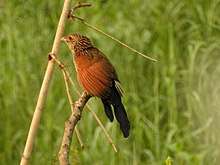Lesser coucal
The lesser coucal (Centropus bengalensis) is a species of cuckoo in the family Cuculidae. It has a wide distribution range that overlaps with several other similar species. The habitat in which it is found is often marshy land with grass and tree cover. It is distinguished by its smaller size, less prominent bill, pale shaft streaks on the feathers of the head and back. It has a much longer claw on its hind toe and a distinct call. It is also among the few coucals that show season plumage differences but like in other coucals, the sexes cannot be distinguished in the field.
| Lesser coucal | |
|---|---|
 | |
| Scientific classification | |
| Kingdom: | Animalia |
| Phylum: | Chordata |
| Class: | Aves |
| Order: | Cuculiformes |
| Family: | Cuculidae |
| Genus: | Centropus |
| Species: | C. bengalensis |
| Binomial name | |
| Centropus bengalensis (Gmelin, 1788) | |
| Subspecies | |
| |
Description
This slightly smaller-sized and shorter-billed coucal has a very long hind claw, the longest within the genus. The overall plumage, as in many other coucals, is of a blackish bird with a long tail and rufous wings. They have two plumages, a breeding plumage in which the head and upper back are glossy with dark shafts to the feather and a duller non-breeding plumage in which the feather shafts on the head and back are whitish. The wing coverts also have pale shafts showing as whitish streaks on the brown feathers. The central upper tail coverts are barred and very long. The iris is darker brown and not the crimson red as in the greater coucal. Juveniles have black spots, bars and have a browner colour.
Distribution and subspecies variation
The species is widely distributed west from the Indian subcontinent (but not in Sri Lanka[2] despite an old report of a skin of doubtful provenance[3]) extending east across Southeast Asia. Slight differences in size and plumage are noted in different parts of their range and several subspecies have been designated. The nominate form is found from India to Thailand. Subspecies lignator described by Swinhoe in 1861 is larger and found in southeastern China and Taiwan. Subspecies javanensis described by Dumont in 1818 is smaller and found across the larger islands along the Malay Peninsula extending east to the Philippines. Some island forms are larger and these include sarasinorum described by Stresemann in 1912 and found on Sulawesi, the Sula Islands, Lesser Sundas and Timor. The form on the Moluccas, medius described by Bonaparte in 1850, is the largest. Some other subspecies like philppinensis from the Philippines and chamnongi from Thailand[4] are not always recognized and are thought to form either variants or intermediate plumages.[5] The population patchily distributed[6] in the Western Ghats of southern India may constitute a distinct subspecies.[2]
Taxonomy and systematics
In the past, this species was lumped along with the Malagasy coucal (Centropus toulou) but comparison of DNA sequences suggest that the lesser coucal is more closely related to the black coucal (Centropus grillii) and Philippine coucal (Centropus viridis) than to any other relatives.[5][7]
Behaviour and ecology
The lesser coucal is found singly or in pairs low in the undergrowth in marshy or grassy areas adjoining forest. They appear to be found mainly in lowlands. Like other coucals, they are not brood-parasitic cuckoos. They nest from May to September but mainly after the rains in June in India, building a dome of grass blades on a low tree.[2] The usual clutch is 3 eggs in India, 2 in Southeast Asia and 4 in Taiwan. The calls of the lesser coucal include a series of low double "whoot-woot" or "kurook" notes that increase in tempo and descend in pitch. The Indonesian name of dudut is onomatopoeic.[5]
References
- BirdLife International (2012). "Centropus bengalensis". IUCN Red List of Threatened Species. 2012. Retrieved 26 November 2013.CS1 maint: ref=harv (link)
- Rasmussen, Pamela C.; Anderton, J.C. (2005). Birds of South Asia. The Ripley Guide. Volume 2. Washington D.C. and Barcelona: Smithsonian Institution and Lynx Edicions. pp. 223–224.
- Butler,AL (1897). "On the occurrence of the Lesser Coucal Centropus bengalensis, Blyth in Ceylon". J. Bombay Nat. Hist. Soc. 11 (1): 162.
- Deignan, H. G. (1955). "Four new races of birds from East Asia". Proc. Biol. Soc. Wash. 68: 145–148.
- Payne, R. B. (2005). The Cuckoos. Oxford University Press. pp. 250–254.
- Philip, V (1993). "Occurrence of the Lesser Crow-Pheasant Centropus tolou in Neyyar". Newsletter for Birdwatchers. 33 (5): 93–94.
- Parkes, Kenneth C. (1957). "Taxonomic notes on the Lesser Coucal, Centropus bengalensis". Bulletin of the British Ornithologists' Club. 77: 115–116.
| Wikimedia Commons has media related to Centropus bengalensis. |
| Wikispecies has information related to Centropus bengalensis |
External links
- Lesser coucal - Species text in The Atlas of Southern African Birds.
